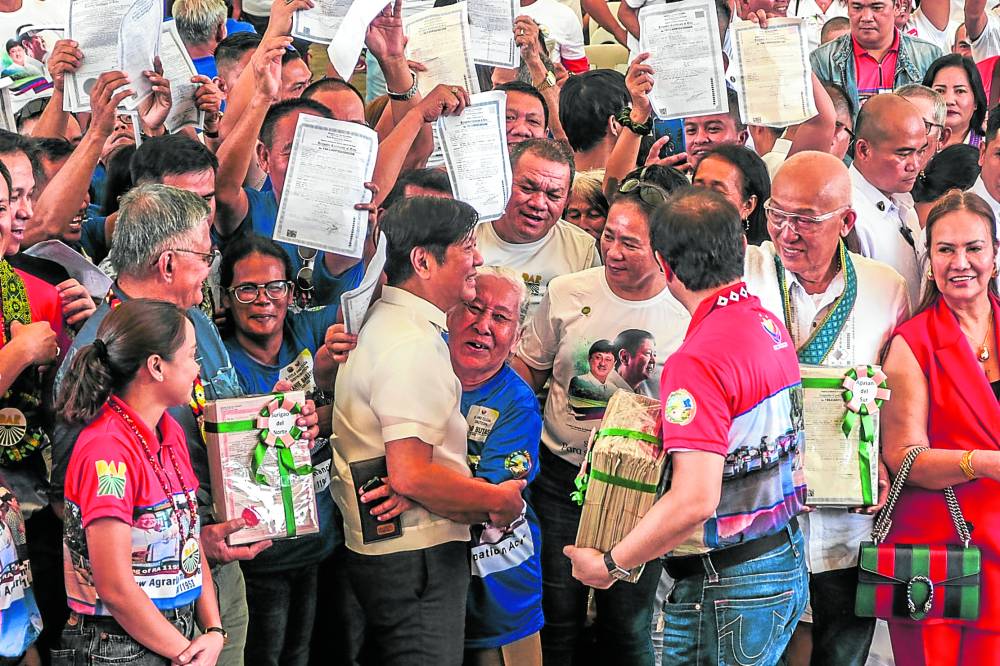Marcos fears ‘ghosts’ if land reform idled

AT LAST President Marcos congratulates families that were finally given titles to their lands. —PPA POOL
President Marcos on Friday said he is determined to complete the distribution of land to farmers under the agrarian reform program by 2028 or risk being haunted by his father’s ghost.
Marcos made the statement in jest in a speech in Prosperidad, Agusan del Sur, where he reiterated his promise to finish the implementation of the program that his father and namesake, the late President Ferdinand Marcos Sr., began in 1971.
The President visited Prosperidad town for several activities, such as the distribution of 3,184 e-titles or certificates of land ownership award covering 4,659 hectares to 2,769 land reform beneficiaries in the Caraga region.
In his speech, Marcos joked that Agrarian Reform Secretary Conrado Estrella III—whose grandfather, Conrado Estrella, was Marcos Sr.’s agrarian reform minister—was not getting enough sleep due to the demands of the program.
“I never stop asking him, when will we finish this, when can we subdivide, when can we finish the list of agrarian reform beneficiaries? This process is always ongoing,” he said.
Article continues after this advertisementThe Chief Executive said he and Estrella both vowed to finish the distribution of lands and benefits to agrarian reform beneficiaries before they step down from office in 2028.
Article continues after this advertisement“It’s surprising. My father began this project—agrarian reform was the first law that he signed. And with him was Estrella’s grandfather,” the President said. “That’s why Estrella and I talked after the campaign. I said, ‘Our ancestors will haunt us if we don’t finish what they started.’ So, we made that oath to finish it.”
In September 1971, Marcos Sr. signed Republic Act No. 6389 or the Code of Agrarian Reform which created the Department of Agrarian Reform (DAR), and RA 6390, which created the Agrarian Reform Special Account Fund.
After declaring martial law on Sept. 21, 1972, Marcos Sr. also signed Presidential Decree No. 2 which declared the country as under the land reform program, and PD 27 which defined the program’s scope.
On Friday, the President recalled the infrastructure projects that his father built in Mindanao and the agrarian reform program that his namesake started—a “burden” that he carried as his father’s son.
He lamented that agrarian reform “remains an unrealized dream” as long as farmers are not completely emancipated from poverty.
‘Finish distributing lands’
“They must be also unshackled from debt, freed from high cost of input, relieved of constraints that impoverish them. As long as our farmers are in debt and their future unsure, our country cannot rise,” Marcos said.He added: “Our fight is not yet over. My goal is to finish distributing lands under the agrarian reform program before my term ends.”
The Chief Executive first made the promise to finish the implementation of the land reform program in December last year, noting that it is taking so long to complete.
In September 2022, he issued Executive Order No. 4, which imposed a one-year moratorium on the payment of amortizations and interest on loans of agrarian reform beneficiaries.
Barely a year later in July 2023, Marcos signed RA 11953 or the new Agrarian Emancipation Act that condoned P206.24 billion in interests, penalties, surcharges and loans of 610,054 land reform beneficiaries tilling 1.173 million hectares of land.
The President was pleased that the DAR awarded land titles covering 109,199 hectares of land to 98,203 beneficiaries from July 2022 to December 2023.In the same event, Marcos also turned over P8.91 million worth of land farm machines and equipment to 1,681 beneficiaries and P194.41 million worth of eight farm-to-market roads in Surigao del Sur spanning 10.367 kilometers.
Earlier on Friday morning, he inspected the P550 million soil laboratory building being constructed in Prosperidad and later distributed 1,200 bags of palay seeds to farmers affected by floods in the province.
“I am also extremely pleased with the establishment of the Agusan Del Sur Provincial Soils Laboratory by the provincial government of Agusan del Sur, the first and the modern one of its kind in Mindanao,” Marcos said.